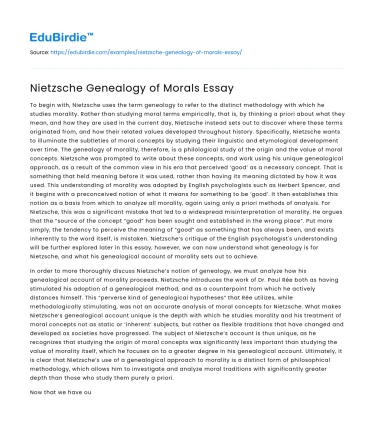To begin with, Nietzsche uses the term genealogy to refer to the distinct methodology with which he studies morality. Rather than studying moral terms empirically, that is, by thinking a priori about what they mean, and how they are used in the current day, Nietzsche instead sets out to discover where these terms originated from, and how their related values developed throughout history. Specifically, Nietzsche wants to illuminate the subtleties of moral concepts by studying their linguistic and etymological development over time. The genealogy of morality, therefore, is a philological study of the origin and the value of moral concepts. Nietzsche was prompted to write about these concepts, and work using his unique genealogical approach, as a result of the common view in his era that perceived ‘good’ as a necessary concept. That is something that held meaning before it was used, rather than having its meaning dictated by how it was used. This understanding of morality was adopted by English psychologists such as Herbert Spencer, and it begins with a preconceived notion of what it means for something to be ‘good’. It then establishes this notion as a basis from which to analyze all morality, again using only a priori methods of analysis. For Nietzsche, this was a significant mistake that led to a widespread misinterpretation of morality. He argues that the “source of the concept “good” has been sought and established in the wrong place”. Put more simply, the tendency to perceive the meaning of “good” as something that has always been, and exists inherently to the word itself, is mistaken. Nietzsche’s critique of the English psychologist's understanding will be further explored later in this essay, however, we can now understand what genealogy is for Nietzsche, and what his genealogical account of morality sets out to achieve.
In order to more thoroughly discuss Nietzsche’s notion of genealogy, we must analyze how his genealogical account of morality proceeds. Nietzsche introduces the work of Dr. Paul Rée both as having stimulated his adoption of a genealogical method, and as a counterpoint from which he actively distances himself. This “perverse kind of genealogical hypotheses” that Rée utilizes, while methodologically stimulating, was not an accurate analysis of moral concepts for Nietzsche. What makes Nietzsche’s genealogical account unique is the depth with which he studies morality and his treatment of moral concepts not as static or ‘inherent’ subjects, but rather as flexible traditions that have changed and developed as societies have progressed. The subject of Nietzsche’s account is thus unique, as he recognizes that studying the origin of moral concepts was significantly less important than studying the value of morality itself, which he focuses on to a greater degree in his genealogical account. Ultimately, it is clear that Nietzsche’s use of a genealogical approach to morality is a distinct form of philosophical methodology, which allows him to investigate and analyze moral traditions with significantly greater depth than those who study them purely a priori.
Save your time!
We can take care of your essay
- Proper editing and formatting
- Free revision, title page, and bibliography
- Flexible prices and money-back guarantee
Now that we have outlined what genealogy is for Nietzsche, and in what unique ways his genealogical account of morality proceeds, we must demonstrate his use of this account to critique other moral systems. Firstly, Nietzsche argues that our seemingly intuitive understanding of morality is simply a product of historical innovation, rather than something consisting of inherent meaning. He shows this predominantly through his exploration of the etymological emergence and development of the value judgments “good” and “bad”. These concepts seem ‘obvious’ and ‘necessary’ to most people, that is, their meanings seem to be inherent to the words themselves. Good, we intuitively believe, has always meant a selfless, altruistic person, and bad has always been a person with harmful, selfish intentions. Through his genealogical account, however, Nietzsche effectively rejects this idea and argues that they are instead the products of gradual historical development. This first critique can be understood as his rejection of “English psychologists”, who were overwhelmingly utilitarian in their moral views, and who understood the judgment “good” to have originated along with those who were “good” themselves. Instead, Nietzsche argues, “the good” themselves established this understanding and adapted it to reflect their own values and actions. It is only through this genealogical approach that Nietzsche is able to argue and analyze this convincing perspective, as it enables him to study not only the present meanings but the development and emergence of each value judgment.
In understanding Nietzsche's Genealogical approach to morality, perspectivism becomes pivotal to fully comprehending the concern felt by Nietzsche, particularly towards the slave revolt of morality, which this essay argues as being eternal to human existence. Through understanding perspectivism, one is able to critique the potentially myopic and futile nature of Nietzsche's argument against societies revolt into alternative ideas of morality, as this essay theorizes, that society is always in a slave revolt, as the natural hierarchies of societies, will always render the latter of hierarchal dichotomy's resentful towards the upper class, positioning them in a vindictive effort to spoil the happiness of these upper classes, driven by a vengeful ressentiment; pushing them to the position of those we consider the priestly. Nietzsche felt that through the slave revolt 'meeks should inherit the earth, but under the meek, a new slave class arose, and again, the slave revolt became eternal. This essay will serve to interpret the essays of Nietzsche in the Genealogy of morals, to fully critique to what extent, Nietzsche's concerns were futile and merely from a place of his own perspectivism, or if the slave morality, is inherently immoral, leading us to a future of inherent decay.






 Stuck on your essay?
Stuck on your essay?

